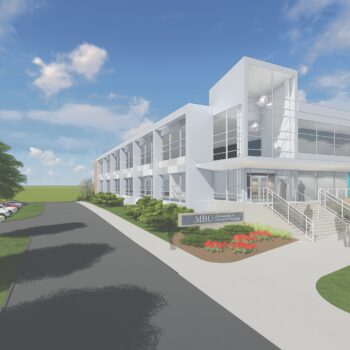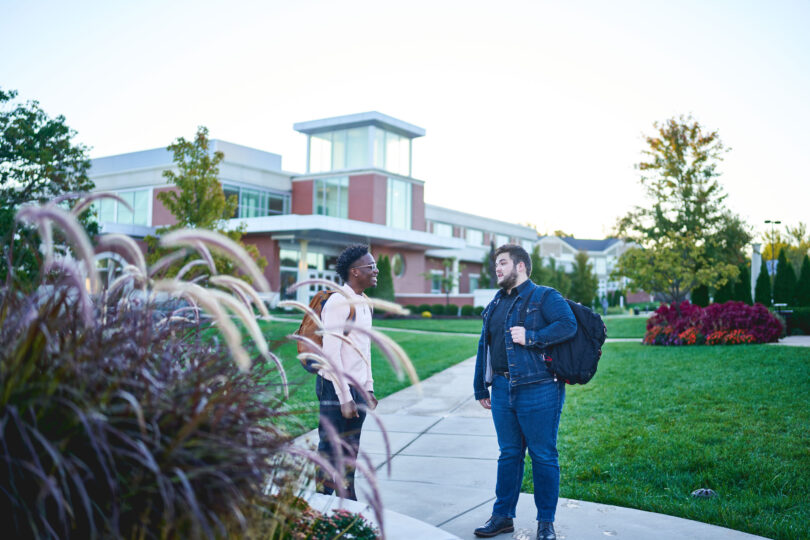The Behavioral Science major is organized within the context of an interdisciplinary liberal arts approach drawing from the disciplines of Criminal Justice, Human Services, Psychology, and Sociology. Each discipline addresses different dimensions of human behavior integrated to form a comprehensive view of the human condition.
Since the Behavioral Science major is interdisciplinary, drawing from the four areas mentioned above, students are not permitted to complete a second major or minor in any of these areas.
Possible Careers
Whether you major in Behavioral Science, or simply take one of our many affiliated courses, you will benefit from the unique mission of MBU’s interdisciplinary program and its dedicated Christian faculty. Majoring in Behavioral Science provides an excellent background to begin work or continue advanced study in any field requiring a strong interdisciplinary understanding of the human condition. Behavioral Science majors might ultimately pursue such careers as:
- Criminologist
- Anthropologist
- Marketing Expert
- Criminal Profiler
- Social Worker
- Lawyer
- Historian
- Grant Writer
- Pastor
- Paralegal
- Social Services Provider
- Public Administration
Behavioral Science Minor Requirements
MINOR: 18 Hours Required courses:
SOCO 113 Introduction to Sociology1
SOHI 213 Worldview and Social Issues1
SOCO 413 Race and Ethnic Relations
PSHU 403 Chemical Dependency
PSSC 443 Death and Dying
MGPS 403/5032 Organizational Behavior and Leadership
Students may not pursue a double minor in Behavioral Science and Sociology.
1Course will satisfy 3 of the 9 hours required in social and behavioral sciences for the general education requirement.
2See the catalog section on Senior Permission for information on earning graduate credit for this course.
Behavioral Science Bachelor’s Requirements
MAJOR Required Core: 21 hours
Required Mathematics (MATH) course:
MATH 243 Probability and Statistics1
Required Psychology (PSYC) courses:
PSYC 133 General Psychology2
PSSC 303 Social Psychology
Required Sociology (SOCO) courses:
SOCO 113 Introduction to Sociology2
SOCO 353 Cultural Anthropology2
PSSC 373 Research Methods in Social and Behavioral Sciences
Required 3-hour Internship (choose one from the following):
CRJS 473 Internship in Criminal Justice
OR
HUSR 473 Internship in Human Services
OR
PSYC 473 Internship in Psychology
Electives: 18 hours (at least 9 hours upper division) with at least one course from each of the following areas. (NOTE: Cross-listed courses with the prefixes PSHU, Psychology/Human Services, and PSSC, Psychology/ Sociology, may be counted under only one discipline, as determined by the student with advisor consent, for purposes of satisfying the distribution of electives among the four disciplines.)
Elective Criminal Justice courses:
CRJS 133 Introduction to Criminal Justice
CRJS 213 Policing Institutions
CRJS 223 Correctional Institutions
CRJS 233 Criminal Investigation
CRPO 303 Foundations of Law
CRJS 313 Criminology
CRJS 333 Juvenile Delinquency and the Justice System
CRJS 343 Criminal Courts, Probation, and Parole
CRJS 423 Criminal Law and Procedure
CRJS 433/5333 Evidence
CRJS 443 Readings in Criminal Justice
CRPO 453 Constitutional Law
CRJS 463/5633 Organization and Administration
Elective Human Services courses:
HUSR 213 Introduction to Human Services
HUSR 223 Human Services: Policy and Politics
HUSR 233 Human Services: Theories and Practice
HUSR 313 Assessment and Case Management
HUSR 343 Disabilities: Theory and Practice
PSHU 403 Chemical Dependency
HUED 403/5033 Theories and Techniques of Group Counseling
HUED 433/5333 Theories and Techniques of Counseling Students and Their Families
HUED 443/5433 Transition/Career Development and Vocational Education
HUSR 443 Leadership in Facilitating Community Change
HUSR 463 Community-Based Treatment
PSHU 483 Tests and Measurement
Elective Psychology courses:
PSYC 213 Personal Adjustment
PSYC 233 Advanced General Psychology
PSYC 313 Human Growth and Development4
PSPO 323 Psychology and the Law
PSYC 323 Abnormal Psychology
PSYC 333 Child Psychology4
PSYC 343 Adolescent Psychology4
PSYC 363 Cognitive Psychology
EDPS 383 Psychology of Teaching and Learning
MGPS 403/5033 Organizational Behavior and Leadership
PSHU 403 Chemical Dependency
PSYC 413 Sensation and Perception
PSRL 423/5233 Pastoral Counseling and Care Giving
PSSC 423 Psychosocial Aspects of Aging
PSRL 433/5333 Psychology of Moral and Spiritual Development
PSYC 433 Theories of Personality
PSSC 443 Death and Dying
PSYC 443 Neuropsychology
EDPS 453/5533 The Exceptional Child
PSHU 483 Tests and Measurement
Elective Sociology courses:
SOHI 213 Worldview and Social Issues
SOCO 323 Marriage and the Family
SOCO 413 Race and Ethnic Relations
PSSC 423 Psychosocial Aspects of Aging
PSSC 443 Death and Dying
Total Hours: 39
1Course will satisfy the statistics requirement for the Bachelor of Science degree.
2Course will satisfy 3 of the 9 hours required in social and behavioral sciences for the general education requirement.
3See the catalog section on Senior Permission for information on earning graduate credit for this course.
4Only one course from PSYC 313, PSYC 333, or PSYC 343 may be applied toward the major.


